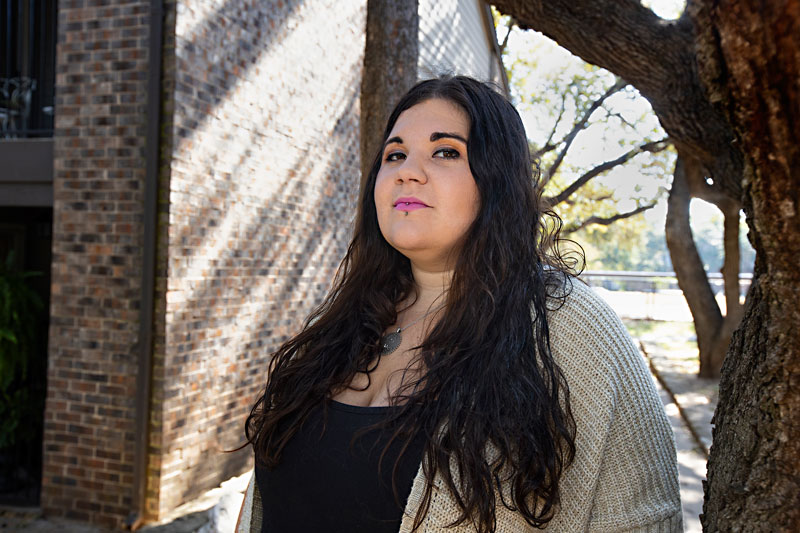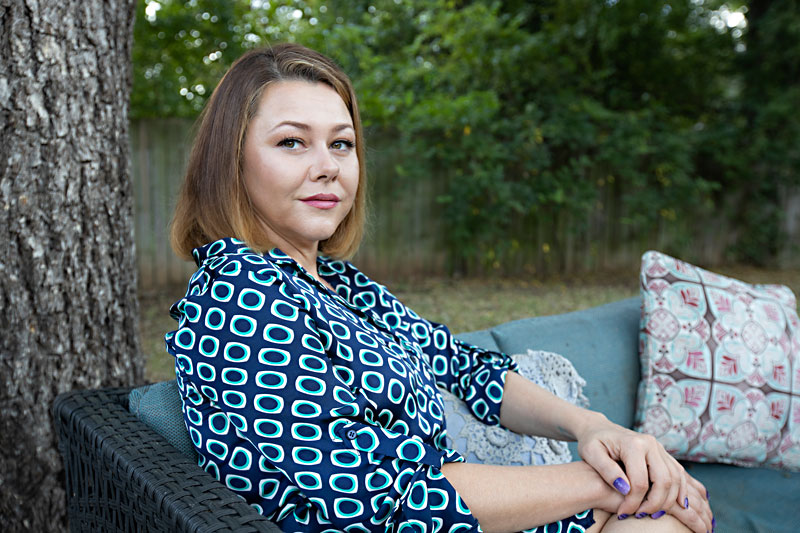Survival, and Hope in How Austin Handles Sexual Assault
As their legal battle continues, women look forward to political change
By Sarah Marloff, Fri., Oct. 23, 2020
For nearly two years, the Austin women who sued local law enforcement over the treatment of sexual assault survivors waited for a ruling that it seemed at times would never come. Then in February, the class action was dismissed by a federal judge who said, basically, he didn't want to get involved. What was a crushing blow for the plaintiffs – women who claim they were raped and subsequently abused by the system meant to protect them – has led to an appeal, a second lawsuit, and commitments to change by the new leadership in the agencies being sued. The bigger battle for systemic change in how rape survivors and their cases are treated is far from over.
"It's been a wild year for everyone, to say the least," Hanna Senko told the Chronicle in October. A month earlier, Senko became the lead plaintiff in a second survivors' lawsuit, this one filed in state court. (The city of Austin, one of the defendants, has now acted to return the case to federal court; it's unclear where it will end up.) Senko and the three new survivor-plaintiffs were also unnamed plaintiffs in the original class action, and she has been seeking change in Travis County's criminal justice system since 2017.
When we spoke, Senko was feeling optimistic. "I really do feel that, after a lot of the advocacy efforts that have been put forward over these past several years – we're starting to see results."
That optimism is shared by many of the survivor-plaintiffs (there are now 12 in total), who point to success beyond the courtroom, at the ballot box: José Garza's resounding victory over incumbent Travis County District Attorney Margaret Moore, one of the defendants in both suits.
"It has been five years since my rape. It's been ups and downs," explained Marina Conner, one of the original plaintiffs in the federal suit. "Moore losing was the first moment that I felt some sort of justice."
Constitutional Rights
Both legal actions accuse their defendants – Moore and her predecessor Rosemary Lehmberg, Austin Police Chief Brian Manley and his predecessor Art Acevedo, and the city and county governments that employ them – of systemic failures that led to gender-based inequitable treatment of women rape survivors. In federal court, the class action alleges this treatment violated the survivors' rights under the U.S. Constitution. The state lawsuit alleges local law enforcement conspired to and successfully violated women survivors' 14th Amendment right to equal protection (which directly applies to state and local government) and also violated the rights of crime victims under the Texas Constitution.
During her four years as district attorney, Moore, her first assistant Mindy Montford, and the District Attorney's Office have been repeatedly accused of mistreating rape survivors and failing to prosecute their cases, including Conner's. (Senko's case was declined prosecution under former D.A. Ronnie Earle.) In response, Moore has defended herself and her office's work, citing more rape cases being prosecuted and the creation of both a dedicated sexual assault unit and her Interagency Sexual Assault Team – formed as an alternative to the existing Sexual Assault Response and Resource Team (SARRT), which Moore claimed was involved in the genesis of the lawsuit against her and severed ties with in 2017.
As we reported in February, the ongoing conflict between the D.A., survivors, and advocates elevated sexual assault as a major issue in this year's election, with both Garza and Erin Martinson citing Moore's handling of survivors and rape cases as a reason for running to unseat her. Garza led Moore in the March 3 primary, and in the July run-off he won a landslide victory with 68% of the vote. Though Garza faces Republican Martin Harry in the general election going on now, he's expected to win and take office in January.
Moore's defeat raises some questions regarding how the survivor-plaintiffs will carry on. But Conner and Julie Ann Nitsch, another plaintiff in the federal suit, clarify: Their action is ongoing. "It's important that people know it's not over," Conner told me. "We are in appeals court. We're not done. Even though she's out of office, she still did these things to us, and we're not going away until we get justice."
Dismissal and Appeal
On August 7, the original eight survivor-plaintiffs appealed the dismissal of their case by U.S. District Judge Lee Yeakel to the 5th U.S. Circuit Court of Appeals. Attorneys Jennifer Ecklund and Elizabeth Myers, representing the plaintiffs in both the state and federal class actions, spoke with us about the filing in September, and Myers confirmed: "The outgoing change in the administration doesn't do anything with respect to the current status of our lawsuit."
The appeal asks the 5CA to reverse Yeakel and rule that the federal court must hear the claims put forth. Yeakel's February 10 dismissal invoked a "Burford abstention," referring to a 1943 Supreme Court ruling, which allows a federal court to choose not to hear any case that is properly before it (such as claims that arise under the Constitution and federal laws, as in the survivors' suit) in order to not interfere with ongoing state and local policymaking on important issues. In this case, Yeakel noted bills enacted by the Texas Legislature, and Austin City Council mandates that went into effect after the suit was filed. He ruled that the D.A.'s Office enjoyed "absolute" prosecutorial immunity and rejected, with prejudice, several claims for which he believed no relief could be granted. But the bulk of the class action's claims, Yeakel argued, should be filed in state court.
However, "The will of the community and the change in leadership that's coming [to the D.A.'s Office] doesn't really change anything in respect to the legal arguments that have been made," explained Myers. "Our team still has to hash that out in court and see what the 5th Circuit does with it." Though the 5CA rarely grants oral arguments – Ecklund estimates that only 30% of cases before the appeals court get fully briefed – the plaintiffs have requested the opportunity to explain the unique constitutional issues involved. The city and county defendants, in their initial responses to the appeal filed in early October, insisted oral arguments are unnecessary.
On Merits and Procedure
This is not the first time such a suit has been brought in federal court, nor is it the first time a case like this has foundered on procedure. Jennifer Laurin, a University of Texas School of Law professor, told the Chronicle that while a number of very similar suits have been filed – brought by rape survivors against similar state actors, raising similar constitutional claims – "to my knowledge none of those have yet ultimately been successful on the merits."
Laurin, whose work includes a focus on criminal justice institutions and the role of constitutional litigation in regulating police, spoke broadly with us, as she did not wish to influence success for either party in the survivors' suit. She noted a number of arguments defendants can raise to defeat such cases: "We don't have a body of law with courts consistently rejecting these claims on the merits" – though this has happened in some cases – "but rather, more often, courts have denied these claims on the basis of some other procedural issue."
If that sounds dubious, Laurin assured it's not necessarily. She explained that "threshold matters" have to be addressed before the merits of a case are heard. "Now, am I saying that courts never use those jurisdiction or procedural threshold matters as a means to avoid the merits of a case? I'm absolutely not saying that that never happens," she said. But sometimes such doctrines, Laurin said, are forthright ways for courts to say, "We think this is a matter best left to other branches of government." As for Burford, Laurin noted that abstention doctrines are meant to be extremely limited exceptions to the rule that federal courts exercise jurisdiction when they have it.
Regarding the appeals process, the plaintiffs have 30 days to reply to the defendants' briefs, filed on Oct. 8, before the court determines whether oral arguments will be granted. And while Moore's loss doesn't impact the suit going forward, Myers noted, "The change in leadership at the District Attorney's Office and County Attorney's Office may result in a change in direction."
The attorneys are optimistic that José Garza will be more willing to work with sexual assault survivors – he has publically promised to make structural changes, such as rejoining the Austin/Travis County SARRT. However, Ecklund said, "Our case isn't over until [the defendants] agree to do a great job and to be monitored in doing that job." She continued: "I'm really hopeful for the changes that are going to come in the new administration, but getting a new administration doesn't end it."
The county defendants disagree. In its initial response to the appeal, the county argues injunctive relief is moot following Moore's loss, while also insisting the D.A. is entitled to "prosecutorial and 11th Amendment immunity" and that the plaintiffs lack "'case or controversy' standing."
Meanwhile, the city, along with Manley and Acevado, opted for a different tactic in its response, which defends Yeakel's abstention, arguing that the plaintiffs' request for "injunctive relief would broadly introduce federal control and intrusion into the management of the City of Austin's police department, from biannual reporting requirements to requirements as vague as handling female survivors' sexual assault cases with the same 'attention' as other cases." But a week later, on Oct. 15, the city filed a Notice of Removal on the state lawsuit to send it to Yeakel's court as well, so it's unclear what the city actually believes.
The First Glimmers of Hope
Nearly 1,000 sexual assaults are reported in Austin each year, but only a handful – less than 25 per year – result in any completed investigation, prosecution, or jail time, the state suit notes. And it's widely believed that only about 10% of survivors report their rape to law enforcement. "The experiences survivors have had with the APD and D.A.'s Office are universal," the plaintiffs argue in their filings, "in the sense that they received little support and no justice at all from government officials sworn to protect them and the public."
In the two years since the first suit was filed, the election represented a rare win in the court of public opinion. "I do think, for our clients, it was very likely the first time that anyone outside their direct support group publicly acknowledged how bad things have been," Myers offered. She described the run-off results as an "acknowledgment from the community that they'd been heard and believed." Other factors contributed to Moore's defeat, including how she has handled Mike Ramos' killing by an Austin police officer. Still, Ecklund believes, "had these women not done what they've done, we would have seen an entirely different election."
Conner confessed she was overwhelmed by the election results. "I cried for a very long time." She signed on to the class action after advocating for survivors' rights at City Council following her assault in 2015. Her rape kit was one of more than 4,000 that sat untested for months or years following the collapse and closure of APD's DNA crime lab. "For years, I was screaming my story at nothing," she said. "I finally felt like someone listened and the city was hearing me."
In light of Garza's win, Conner feels hopeful about the appeal – a 180-degree turn from how she felt in February when she learned, via a tweet from a reporter, that Yeakel had dismissed the case. "I couldn't function. It was just another way I'd been let down by the criminal justice system," she said. Then she became angry, asking: "How did you [Yeakel] look at all of us in that courtroom and acknowledge we had all been raped, and then so single-handedly turn around and say it's not [your] business to figure out if they were also harmed by the city and the county?"
Nitsch was also relieved by the electorate's decision. The small number of rape cases that proceed to prosecution sticks with her, and she hopes to see violence against women considered in ongoing conversations about reimagining public safety. "We say we believe women, we have hashtags ... but it's not a part of the system yet."
Though neither woman is a plaintiff in the new state suit, both feel closely connected to it. Conner said she's "in awe" of the four women who've come forward to continue the fight for better treatment for rape survivors. "Rereading your story, word for word, in a court document, in legal-speak, is one of the hardest things I've done," she explained. "To put that trust in our lawyers and to go through the legal system again – it takes a lot of strength."
A New Day in Court
Hanna Senko began looking into her case a decade after former D.A. Earle declined to prosecute. As recounted in the state court filing, Senko was date-raped in December 2006, by a man she knew. She suspects she was drugged, but her case was closed before the final toxicology report was available. In 2017, she decided to learn more; she eventually got involved with the survivors' suit after meeting with Ecklund and Myers. She told me, "I realized there wasn't something wrong with me and my case, but there was something much larger going on."
Her goal, as a survivor and now the lead plaintiff in the second suit, is systemic change. "I have said from the beginning that this really isn't about me and my case, because there's no changing that. ... But if it's my name, my voice, my face that can help bring change as a visible survivor, then here I am."
Moore's loss also plays a role in Senko's hope that this suit will see a different outcome. Senko described the aftermath of Yeakel's dismissal as a crash. "For me, it was about the timing," she said. Yeakel's ruling came less than a month before the primary. "It felt incredibly politically motivated, which brought a new layer of 'wow – we still can't trust the system.'"
The city's move for removal is the latest twist in the courtroom drama. Removal is a legal process that allows defendants a 30-day window after being served with a state lawsuit to send the case to federal court – in this case, Yeakel's court – if it raises significant federal questions and claims under the U.S. Constitution. Plaintiffs will be able to file a Motion to Remand to argue that the federal court should send the case back. Though that's not an uncommon legal tactic, it's worth noting that before Yeakel dismissed the survivors' first lawsuit, the city's attorneys argued before his court that the class action was more appropriate for state court to consider, because it raised issues of great interest to the state. In his dismissal, Yeakel seemingly agreed.
Speaking to me before the removal was filed, UT Law's Laurin explained that federal and state courts differ in the scope of their jurisdiction and procedural law as it applies to cases, but both can handle federal constitutional claims. Regarding the two survivors' suits, Laurin pointed out their similarities and said, "The main way in which they differ is, in state court, the court will not be bound by some of the same doctrines the federal court invoked to decline to hear the case." There may be other procedural hurdles, she noted.
Still, this has little to do with the merits of either case. Speaking to the original suit, Laurin added, "I think it's important for people to know that, even though the suit was dismissed, there isn't any court's finding that neither federal or state law was violated."
Though the second suit could be described as the next step, Ecklund emphasized it's much more than that. "For this group of women, this is a very intense and personal choice that they're making to be the next front. It's emotional work."
Myers noted how policies set by the D.A.'s Office and the city directly impact thousands of people's lives. She also added that, with the 87th Texas Legislature convening in 2021, there's more work to be done at the state level. "There are a lot of different inputs into the system," she said. "All of them have to be functioning well and correctly to overhaul the change that we need."
Currently though, the work of changing the system relies squarely on the women who've survived rape. "There's no way for them to get the needs they want, or seek the involvement of other people, without reliving what happened to them over and over and over again," said Ecklund. "I don't want to minimize that."
Myers agreed. "I'm frankly looking forward to a day when that isn't the required process. Where people will recognize the need to change the system without women being constantly forced to publicly relive their trauma."
An earlier version of this article incorrectly stated Hanna Senko's case was declined prosecution under former D.A. Rosemary Lehmberg. Senko's case was declined prosecution under former D.A. Ronnie Earle.
Got something to say on the subject? Send a letter to the editor.













